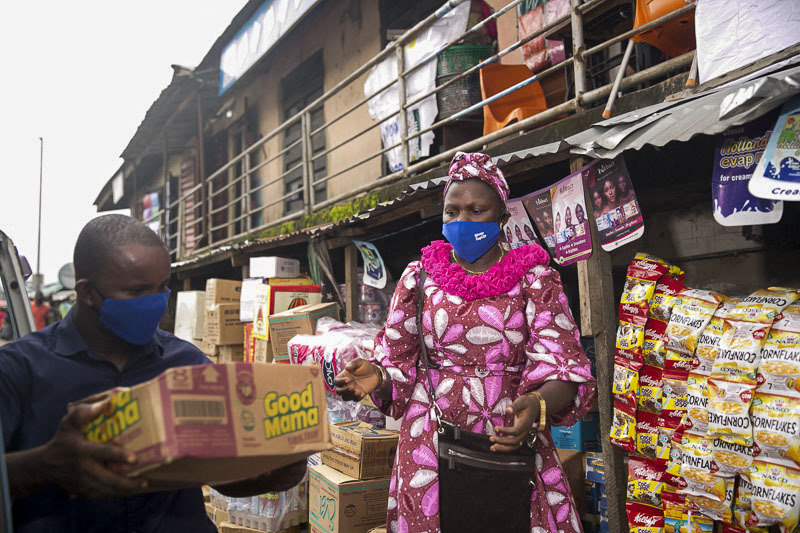TradeDepot, the B2B eCommerce platform for consumer goods in Africa, has today released new insights from its market data that highlights the trends that will shape Nigeria’s retail sector in 2021.
According to TradeDepot, the impact of the pandemic, rising inflation, border closures and other issues drove significant changes in behaviour for retailers, distributors and manufacturers in 2020. As the sector settles into the new year, TradeDepot predicts that some of the main trends that shaped 2020 – particularly smaller packaging for consumer goods and increased spending on food and essential goods due to dwindling disposable income and people spending more time at home – will continue to influence behaviour across the market.
The retail sector is the third largest contributor to Nigeria’s Gross Domestic Product (GDP) and more than 90 percent of the sector is made up of informal retailers. TradeDepot has built a network of more than 50,000 micro retailers, working with global distributors and manufacturers like Nestlé, Unilever, GB Foods and Danone to make household supplies such as milk, soap, detergent and other essentials more accessible and affordable. The top insights from TradeDepot’s data include:
Key trends from 2020
-
Across the retail sector, the pandemic led to an increase in store owners exploring alternative channels of reaching, acquiring and servicing customers – especially online and social media. Demand for TradeDepot’s services increased by 500%, with a 300% increase in transaction value and volume on the back of the pandemic.
-
Consumer buying patterns shifted slightly towards more food items, with growth in purchase of food and essentials as opposed to other categories. TradeDepot’s data revealed a 10% increase in the overall contribution of food items to the distribution volumes, compared with 2019.
-
In the drinks category, the lockdown impacted the ability of manufacturers and distributors to sell into bars, restaurants and clubs, which usually account for up to 60% of their revenue. As a result, many shifted their attention to Mom and Pop, convenience stores etc to cushion the impact
-
In the detergent category, price increases driven by inflation led many manufacturers to either introduce or expand production capacity for smaller packs (25g, 90g, 190g, etc) to drive more volume in the consumer segment of the market, which accounts for 65% of the market. The pandemic also saw the introduction of more hygiene-related products to help curtail the spread of the virus
What do these trends mean for the Nigerian retail sector in 2021
-
We foresee manufacturers adapting to rising inflation and dwindling disposable income by extending the trend of smaller packs to other product categories
-
Manufacturers will explore more alternative route-to-market channels with capabilities to build retail networks and offer logistics-as-a-service to mitigate the risks that come with serving new customer bases
-
We expect an increase in the number of challenger value brands and new market entrants offering lower priced products in key categories as consumers get increasingly price conscious and more eager to experiment with new, lower-priced products.
-
We also anticipate a rise in products and services designed to help consolidate and improve the industry. There could be more competition higher up in the value chain with more platforms designed to provide auxiliary services like goods packaging and processing etc.
-
With the pandemic still ongoing, we envisage that people will continue to take a cautious approach to mingling in crowds and will spend more time at home than in previous years, As a result, spending on food and essential goods is likely to increase
Challenges and opportunities for 2021
-
There are challenges with data aggregation because it is a relatively new discipline in this space but so there’s an opportunity for companies with the right capabilities to capture this and utilise it to cater to the audience. Structured access to short term inventory financing at minimal interest rates will also help stimulate growth
-
There are also challenges with infrastructure and logistics, which makes it difficult for store owners to meet the demands of the customers and grow their businesses.
-
Access to working capital is still the biggest challenge most retailers face in trying to grow their business. There has been some progress with financial services for consumers in recent years and there is potential for many of the learnings to be adapted for retailers
According to Onyekachi Izukanne, CEO and Co-Founder of TradeDepot, “the retail sector is one of the strongest pillars of the Nigerian economy but the absence of data and verifiable insight often makes it difficult to assess the opportunities and challenges that abound in the space. The sector is also hampered by infrastructure and logistics issues that undermine the efforts of the industrious business owners. With some more support from government, public institutions and private sector players, there is the potential to transform the Nigerian retail market and achieve a quick win for boosting the nation’s GDP”.

